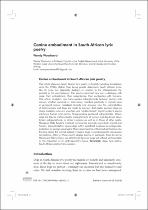| dc.description.abstract | This article discusses South African lyric poetry in English including translations
since the 1960s. Rather than being private statements, South African lyrics,
like all lyrics, are essentially dialogic—in relation to the philosophical, the
political or the psychological. The poems examined here are in dialogue with
dogs, their embodiment, their subjectivities, their contiguities with humans.
This article considers how trans-species entanglements between human and
canine, whether convivial or adversarial, manifest poetically in myriad ways
in gendered and/or racialised contexts and analyses how the vulnerabilities
of both humans and dogs are made to intersect. Ruth Miller portrays dogs as
divine creations who are uncertain and “embarrassed”. Ingrid Jonker’s poems
intertwine human and canine, foregrounding gendered vulnerabilities. Where
dogs are figured metonymically, entanglements of human and dog break down
binary categorisations, in Jonker’s poems as well as in those of other poets. | en_US |

